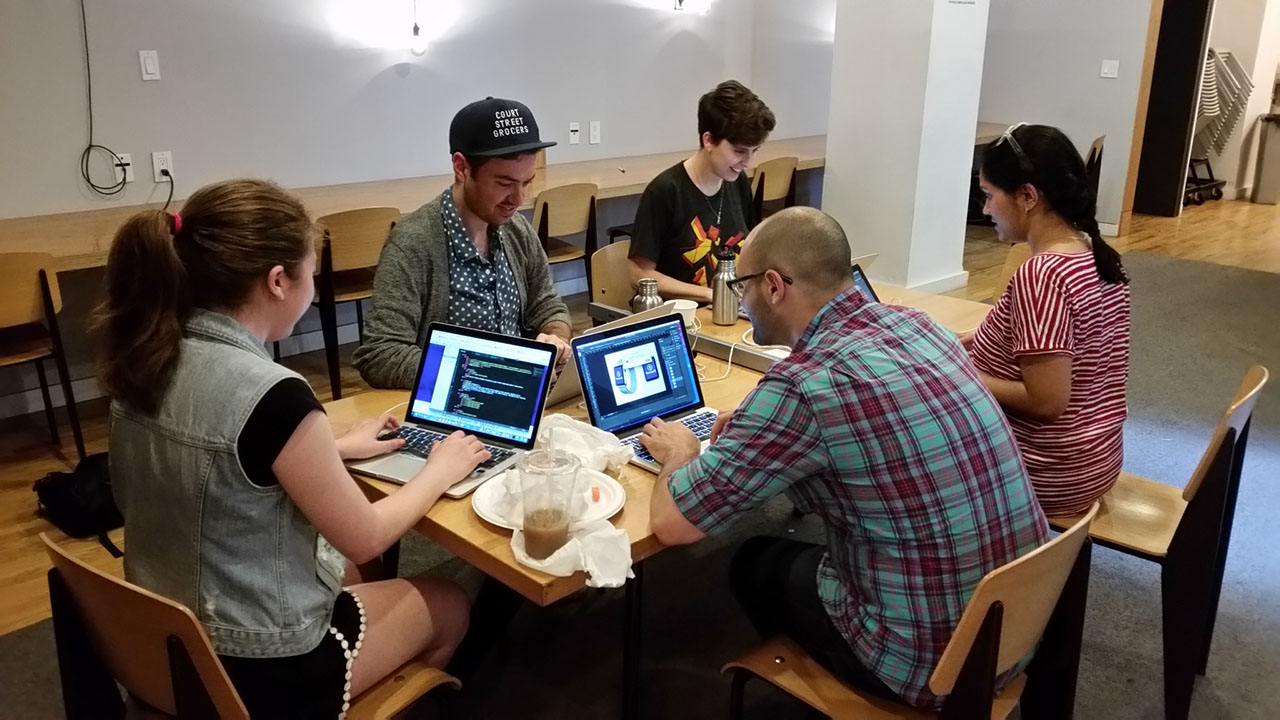This past weekend, over 80 coders, developers and comedians hunkered down for a weekend of hacking, all with the intent of mocking American culture and our increasing reliance on technology for even mundane tasks. The event led to the creation of websites like FeminizeIt, a website that searches for the female version of products; Mansplainr, a service that will mansplain any topic to you; and MomMMS, which sends automatic updates to your mom for every 100 texts you send out.
Comedy Hack Day is not unlike NYU ITP’s “Stupid Shit No One Needs & Terrible Ideas Hackathon,” but instead of being conceived by technologists, the weekend-long event was pioneered by comedians who run Cultivated Wit, a tech and communications firm that aims to spread the funny. “For the comedians, they get to see a joke idea come to life and become something the world can interact with,” Cultivated Wit founder Baratunde Thurston explained in a blog post. “For the tech crowd, they get to use their super powers for something a bit more creative and fun than database optimization and corporate intranet design.”

The Comedy Hack Day is now in its third year, and according to Thurston, a group of 65 people (balanced almost equally across genders, with 35 men and 30 women) presented a “record” number of 147 ideas on Friday night at General Assembly in New York. Participants then organized into groups, brought together by the ideas and skill sets. The groups worked throughout the weekend to implement the idea and then comedians Aparna Nancherla and Michael Ian Black, and tech writers Christina Warren and Anil Dash, judged the top creations in a live show.
Unlike the “Stupid Shit” hackathon, the event helped comics realize the capacity for comedy in tech by putting them into a coding environment. New York-based comic Kate Sidley, who conceived of FeminizeIt, said the event was “like a crash course in how to build websites and app.”
The idea for FeminizeIt came from Sidley’s observation when, looking for sunscreen, she observed that the same company marketed the product differently to the sexes. “I noticed that the description for men said it was strong. The packaging for women said you could trust it.” In the background, the site works by adding “woman” to any word or phrase you search for. Here, you can see the feminized results for “remote control”:

“My group worked really well together, but the hardest thing for me was how useless I was most of the time,” she said, but also explained that she plans to continue working with the developers she collaborated with. When asked if she might turn to technology for some of her comedy, Sidley said, “Absolutely, I would see myself merging comedy and tech more after this. It definitely opened up for me that there’s a lot of opportunity for comedians to do websites or do apps.”
Comedy Hack Day was “a great resource for comedians,” she said.
On the flip-side, developers also learned about how comedy can generate excitement for a new project or service. Neal Shyam, a marketer and hacker who worked on MomMMs, highlighted why Comedy Hack Day was so different from other hackathons. “I didn’t realize it at first, but comedy hack day isn’t a traditional hackathon at all,” he said. “It’s a comedy/sketch show anchored by technology,” he said. “The demos, the pitches, the apps — it’s all about creating a solid joke that lands well. On Saturday night, some of the best demos were just interactive prototypes that weren’t build out apps yet.”
None of the sites or services made at Comedy Hack Day have gone on to become real companies, but Shyam says they definitely “replay value” and “hit a social angle.”
“It’s obviously up to the hackers to push forward, but I really hope they do!” he says.
(Photo: Kate Sidley)



